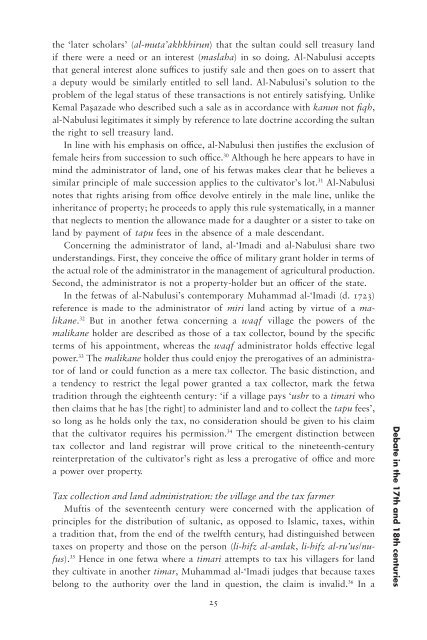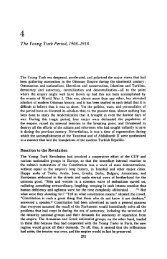Governing property, making the modern state - PSI424
Governing property, making the modern state - PSI424
Governing property, making the modern state - PSI424
You also want an ePaper? Increase the reach of your titles
YUMPU automatically turns print PDFs into web optimized ePapers that Google loves.
<strong>the</strong> ‘later scholars’ (al-muta’akhkhirun) that <strong>the</strong> sultan could sell treasury land<br />
if <strong>the</strong>re were a need or an interest (maslaha) in so doing. Al-Nabulusi accepts<br />
that general interest alone suffices to justify sale and <strong>the</strong>n goes on to assert that<br />
a deputy would be similarly entitled to sell land. Al-Nabulusi’s solution to <strong>the</strong><br />
problem of <strong>the</strong> legal status of <strong>the</strong>se transactions is not entirely satisfying. Unlike<br />
Kemal Paşazade who described such a sale as in accordance with kanun not fiqh,<br />
al-Nabulusi legitimates it simply by reference to late doctrine according <strong>the</strong> sultan<br />
<strong>the</strong> right to sell treasury land.<br />
In line with his emphasis on office, al-Nabulusi <strong>the</strong>n justifies <strong>the</strong> exclusion of<br />
female heirs from succession to such office. 30 Although he here appears to have in<br />
mind <strong>the</strong> administrator of land, one of his fetwas makes clear that he believes a<br />
similar principle of male succession applies to <strong>the</strong> cultivator’s lot. 31 Al-Nabulusi<br />
notes that rights arising from office devolve entirely in <strong>the</strong> male line, unlike <strong>the</strong><br />
inheritance of <strong>property</strong>; he proceeds to apply this rule systematically, in a manner<br />
that neglects to mention <strong>the</strong> allowance made for a daughter or a sister to take on<br />
land by payment of tapu fees in <strong>the</strong> absence of a male descendant.<br />
Concerning <strong>the</strong> administrator of land, al-‘Imadi and al-Nabulusi share two<br />
understandings. First, <strong>the</strong>y conceive <strong>the</strong> office of military grant holder in terms of<br />
<strong>the</strong> actual role of <strong>the</strong> administrator in <strong>the</strong> management of agricultural production.<br />
Second, <strong>the</strong> administrator is not a <strong>property</strong>-holder but an officer of <strong>the</strong> <strong>state</strong>.<br />
In <strong>the</strong> fetwas of al-Nabulusi’s contemporary Muhammad al-‘Imadi (d. 1723)<br />
reference is made to <strong>the</strong> administrator of miri land acting by virtue of a malikane.<br />
32 But in ano<strong>the</strong>r fetwa concerning a waqf village <strong>the</strong> powers of <strong>the</strong><br />
malikane holder are described as those of a tax collector, bound by <strong>the</strong> specific<br />
terms of his appointment, whereas <strong>the</strong> waqf administrator holds effective legal<br />
power. 33 The malikane holder thus could enjoy <strong>the</strong> prerogatives of an administrator<br />
of land or could function as a mere tax collector. The basic distinction, and<br />
a tendency to restrict <strong>the</strong> legal power granted a tax collector, mark <strong>the</strong> fetwa<br />
tradition through <strong>the</strong> eighteenth century: ‘if a village pays ‘ushr to a timari who<br />
<strong>the</strong>n claims that he has [<strong>the</strong> right] to administer land and to collect <strong>the</strong> tapu fees’,<br />
so long as he holds only <strong>the</strong> tax, no consideration should be given to his claim<br />
that <strong>the</strong> cultivator requires his permission. 34 The emergent distinction between<br />
tax collector and land registrar will prove critical to <strong>the</strong> nineteenth-century<br />
reinterpretation of <strong>the</strong> cultivator’s right as less a prerogative of office and more<br />
a power over <strong>property</strong>.<br />
Tax collection and land administration: <strong>the</strong> village and <strong>the</strong> tax farmer<br />
Muftis of <strong>the</strong> seventeenth century were concerned with <strong>the</strong> application of<br />
principles for <strong>the</strong> distribution of sultanic, as opposed to Islamic, taxes, within<br />
a tradition that, from <strong>the</strong> end of <strong>the</strong> twelfth century, had distinguished between<br />
taxes on <strong>property</strong> and those on <strong>the</strong> person (li-hifz al-amlak, li-hifz al-ru’us/nufus).<br />
35 Hence in one fetwa where a timari attempts to tax his villagers for land<br />
<strong>the</strong>y cultivate in ano<strong>the</strong>r timar, Muhammad al-‘Imadi judges that because taxes<br />
belong to <strong>the</strong> authority over <strong>the</strong> land in question, <strong>the</strong> claim is invalid. 36 In a<br />
25<br />
Debate in <strong>the</strong> 17th and 18th centuries












